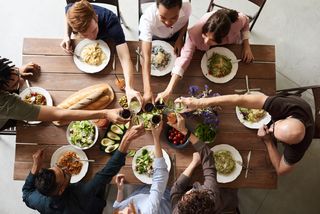
Diet
What You're Missing Out on When You Eat at Your Desk
Food isn't just about nutrition. It also serves an important social function.
Posted February 24, 2020 Reviewed by Lybi Ma

It is a common point of lament from my father that no one goes out for lunch anymore. He’s a man who came up in a different era, and in that era, business was done over meals. There were no food delivery services that would bring your meal to your office, nor were there convincing meal replacement drinks that could consolidate your nutritional intake into a couple of swigs. Your only option was to go out to a restaurant. That was also everyone else’s only option, and so they might as well come too. But as millennials have stirred up our habits around lunchtime, we’ve lost sight of the point of a midday meal: it isn’t just about efficiency.
In the minds of many of America's most productive workers, food is simply about nutrition. And nutrition is a numbers game—how efficiently can you get the nutrients you need to keep your body performing in the way you want? In the optimal scheme, our nutritional intake would resemble a car’s. We’d periodically make a quick pitstop to refill the tank, something that would be over in a matter of moments. There would be no friction between what it takes to keep us going and actually getting stuff done.
But a recent paper by Oxford evolutionary psychologist Robin Dunbar explores a broader context of what meals are for. Dunbar argues that meals are not just about addressing your nutritional needs, but also important forms of social interaction. In a survey of over 2,000 adults in the UK, Dunbar looked both at how often people ate communally and at several different measures of well-being. He found that eating meals with others was correlated with feeling better about oneself, a higher level of overall life satisfaction, and having a larger social support network. And while these trends held for lunch dates, they were even stronger for evening meals. You may also be pleased to note that having a few glasses of wine over dinner made these trends even stronger.
While these results are correlational, Dunbar conducted a further causal analysis of his data. He found support for the claim that it was indeed the case that having consistent meals with other humans was the source of happiness, rather than happier humans simply seeking out the presence of others.
It is worth considering this idea in the broader scope of human existence outside of purely economic activity. The greatest platform for human connection has always been the meal hall, the watering hole, the pub, the coffee shop, and the dinner table. If you’ve ever wondered why it’s so difficult to come up with activities to do with your adult friends outside of consuming food and beverage (and escape rooms), it’s because that’s what humans do. When we want to connect with others, we eat and we drink with them. We always have, and we always will.
And this isn’t just about the logistics getting people together (everyone must eat, after all), but also about one of our most significant sources of identity: Our memories. A recent study by a group of psychologists at UCLA looked at the strength of memories while people were eating versus while they were doing other activities. In the key experiment, the researchers had subjects watch a video while either eating M&Ms or simply moving the M&Ms around on their desks. When the subjects were later asked to recall what happened in the movie, their memory was consistently stronger when they were actively engaged in eating. In large part, communal meals are the souvenirs of a life lived in the presence of others.
Perhaps there is something to my father’s plaint beyond the standard charges against the kids these days. As for myself, my personal heuristic is to shoot for at least one meal in the presence of other human beings per day. And that means properly sitting down with them, breaking bread, and asking them about what they’ve been up to. It is often too much to ask for more than once a day, and even that single meal often feels like a time-suck. But in my experience, it’s an important ingredient in mental health. The available evidence also bears this out, and so it is worth taking stock to find a legitimate balance between the optimal intake of nutrients and the soul-enriching communion of eating in the presence of others.
References
Dunbar, R. I. M. (2017). Breaking bread. Adaptive Human Behaviour and Physiology, 3(3).
Seitz, B. M., Blaisdell, A., & Tomiyama, A. J. (2019). Calories Count: Meal Memories are Evolutionarily Special. https://doi.org/10.31234/osf.io/d54cp

